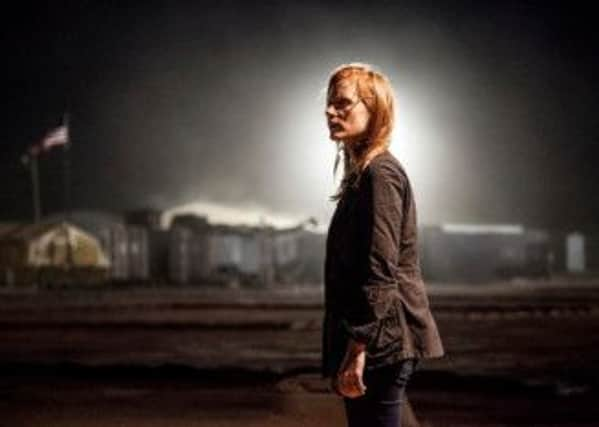Natalie Stendall film review: Zero Dark Thirty gripping and masterful in tension building


In The Hurt Locker, Bigelow gave us an emotionally charged study of a soldier hooked on the rush of warfare. In Zero Dark Thirty, Bigelow shifts towards objectivity, putting in a fierce effort to present an impartial view. From location and event titles, to the injection of real-life news footage and the absence of any detailed character backstories, Zero Dark Thirty has a noticeably detached, journalistic feel. Yet Zero Dark Thirty’s portrayal of torture is the source of much controversy.
In line with its genre, Zero Dark Thirty hinges much of its success on historical accuracy, something that experts and journalists have questioned. The extent to which the capture of Bin Laden depended upon evidence gathered during interrogations involving the torture of suspects, has been keenly debated. Although Zero Dark Thirty gives no definitive answers here - leaving the relative importance of its clues unclear - by aspiring for objectivity, Zero Dark Thirty opens itself up to criticism regarding factual accuracy more than the average historical or political drama.
Advertisement
Hide AdAdvertisement
Hide AdWhether audiences view its detached, journalistic style as a dangerously naive or inspired approach will likely depend on the individual, and Zero Dark Thirty requires the viewer to objectively question rather than take its events at face value.
Scenes of torture - waterboarding, sleep deprivation and humiliation - feature heavily in the film’s early sequences. These scenes are hard to watch, brutal and ruthless, but Bigelow avoids presenting them as sadistic or glamourous. While some of its characters appear to come down in favour of torture, the film as a whole does not make a clear judgement about its use. Bigelow neatly signposts the shift to other forms of surveillance and, as the CIA questions whether evidence gathered through interrogation is viable, the morality debate is left open. Where Bigelow’s Zero Dark Thirty briefly slips from its objectivity, it is in placing side-by-side the highly emotive telephone recordings from 9/11 with scenes of torture in the film’s opening moments.
Despite the controversy surrounding it, Zero Dark Thirty is a well crafted and absorbing thriller. Screenwriter, Mark Boal (The Hurt Locker) is not afraid to let his plot move slowly, focussing on the finite machinations of the CIA in the search for Bin Laden. Interactions are loaded with jargon about terrorist ‘tradecraft’ and Zero Dark Thirty becomes an intense study of the CIA workplace. Slowly building tension emphasises the pressure placed on CIA operatives, underlined in a sharp tirade from a senior CIA official (Mark Strong), ‘this is it, there’s nobody else hidden away on some other floor, it’s just us and we are failing’.
Zero Dark Thirty is propelled forward by an outstanding performance from Jessica Chastain as CIA operative, Maya (Jessica Chastain). Chastain gives her most considered and powerful performance to date, capably transforming her character from uncomfortable and doubting, to self-assured and confident. As the tension builds, Maya’s determination verges on obsession and Chastain surges with frustration in a heated argument with Station Chief Joseph Bradley (Kyle Chandler). Even here, Boal’s screenplay avoids over-dramatisation, giving us only fleeting insight into Maya’s backstory.
Advertisement
Hide AdAdvertisement
Hide AdAs the film enters its final, climactic act - the Navy Seals’ invasion of Bin Laden’s compound - Zero Dark Thirty breaks with movie-making conventions as its main character slips almost entirely out of view. While this is a brave move on the part of Bigelow, introducing us to new characters at such a late stage in the film, it once more underlines the film’s objective style. Bigelow resists temptation to artificially heighten the tension by interrupting the Seals’ mission with clips of the ‘control room’. Instead, she gives us a masterfully made, slow burning action sequence, brimming with intensity. Powerfully photographed by cinematographer, Grieg Fraser (Killing Them Softly) and with a dark, yet subtle score from Alexandre Desplat (Argo, Rust And Bone), this is exquisite film-making.
That Bigelow manages to create such tension and anxiety here, when her audience is already aware of the outcome, is a testament to her film-making skill. As the Seals invade the compound under the green glow of night vision, harsh sounds penetrate the silence in horrific fashion - from doors being blown open, to shots of gunfire and children screaming, there is no escaping the brutality of these events.
The verdict: Kathryn Bigelow’s Zero Dark Thirty is masterful in its tension building and unwavering journalistic style that, in all its coolheaded detachment, is unexpectedly gripping. Rarely has a political thriller felt more real than this. Yet, in its strive for objectivity, Zero Dark Thirty opens itself up to greater levels of factual scrutiny than other films in its genre that pursue a more dramatic approach. Moral ambiguity lies at the heart of this intense thriller, that leaves the inquisitive viewer to decipher the ethical debate for themselves.
Certificate: 15
Running Time: 157 minutes
Verdict: 4/5